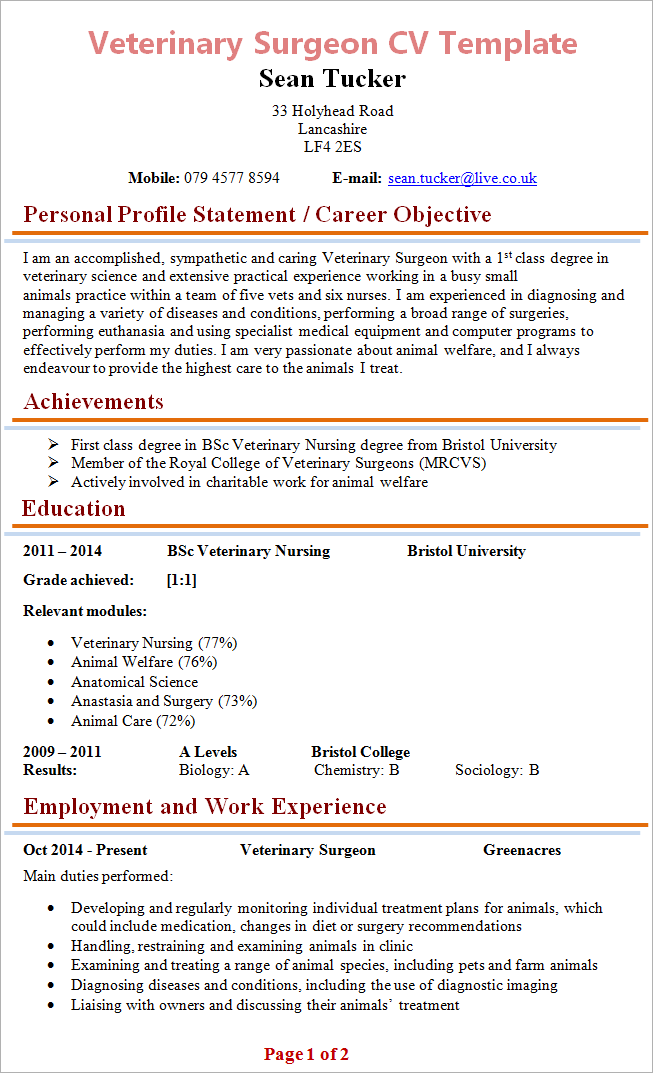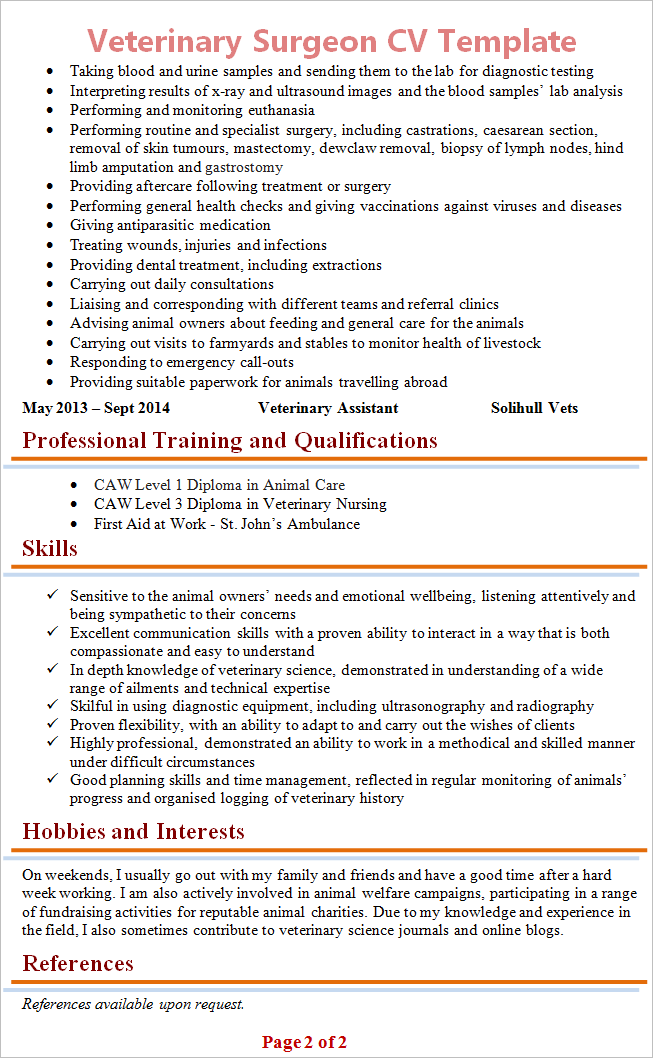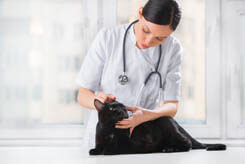 Sobhan Mohmand, Career Expert
Sobhan Mohmand, Career Expert  1 Jan 2024
1 Jan 2024
As a veterinary surgeon, you will be responsible for diagnosing and treating the injuries or illnesses of animals.
There are limited vacancies for this role and competition is high, so it is essential that you have a strong veterinary surgeon CV that will increase your chances of being invited for a job interview.
This guide has been created to help you achieve this goal – let’s get started!
33 Holyhead Road
Lancashire
LF4 2ES
Mob: 079 4577 8594 Email: [email protected]
I am an accomplished, sympathetic and caring Veterinary Surgeon with a 1st class degree in veterinary science and extensive practical experience working in a busy small animal practice within a team of five vets and six nurses. I am experienced in diagnosing and managing a variety of diseases and conditions, performing a broad range of surgeries, performing euthanasia and using specialist medical equipment and computer programs to effectively perform my duties. I am very passionate about animal welfare, and I always endeavour to provide the highest care to the animals I treat.
| 2011 – 2014 | BSc Veterinary Nursing | Bristol University | Grade achieved: [1:1] |
Relevant Modules:
| 2009 – 2011 Results: Biology: A Chemistry: B Sociology: B | A Levels | Bristol College |
| 2002 – 2009 Results: 12 GCSEs at Grades A*- C. | GCSEs | Bristol Academy |
| Oct 2014 – Present | Veterinary Surgeon Greenacres |
Main duties performed:
| May 2013 – Sept 2014 | Veterinary Assistant Solihull Vets |
Main duties performed:
On weekends, I usually go out with my family and friends and have a good time after a hard week working. I am also actively involved in animal welfare campaigns, participating in a range of fundraising activities for reputable animal charities. Due to my knowledge and experience in the field, I also sometimes contribute to veterinary science journals and online blogs.


At the top of your CV, write down your personal details such as your full name, address or location, telephone number and email address.
You can also include your LinkedIn profile if you have one.
A personal profile, also known as a CV summary, is the opening statement of your CV. It is a short introduction (around 3-5 lines) that outlines your personal characteristics, abilities, experience and future career ambitions.
An effective profile should demonstrate your skills and achievements with real-life examples, rather than vague statements. As they say, talk is cheap!
Veterinary surgeon CV personal profile statement:
I am a skilled and experienced veterinary surgeon with a degree in Veterinary Medicine and more than five years of experience in the industry. I am passionate about caring for animals and giving them the best medical treatment that is available. My expertise include using diagnostic equipment, performing surgeries and giving advice to pet owners. I have excellent interpersonal skills, demonstrated in my current role as a Vet at Pets Clinic Ltd. where I have worked with many veterinary nurses, technicians and clients.
Click here for more personal profile examples.
You can “spice up” your CV by listing your key achievements in this section.
Employers are more interested in your achievements than your duties so keep the details about your day-to-day responsibilities concise and concentrate more on the positive results of your actions.
What are examples of achievements?
The employment section is arguably the most important part of your CV. It should tell the potential employer in a quick glance…
Each job entry should consist of the following information:
| March 2020 – Present | Veterinary surgeon Pets Clinic Ltd., London |
Main duties and responsibilities performed:
Mention your important education, training and qualifications in this section.
Each education entry should consist the following information:
| 2013 – 2018 | Veterinary Medicine (BVetMed) | University of London | Grade achieved: First class honours. |
Relevant Modules:
| 2011 – 2013 Results: Biology (A), Physics (A) and Maths (B). | A-Levels | Sutton Community College |
Find out how to present your degree on your CV.
The qualifications section of your CV should contain a list of additional qualifications that you have have gained on top of the education that you have listed in the previous section. Mostly, these are professional training qualifications.
Next, highlight your key skills, strengths and abilities in the skills section.
Many roles require a specific skillset which is required to do the job well. Employers highly value applicants that possess these skills or are willing to learn them.
Useful skills to add to your vet CV
Your hobbies are not as important as your education or work experience. However, mentioning your hobbies and interests on your CV can have several benefits:
Note: only include interests that are relevant and add value to your CV.
The last part of your CV is the references section.
Here you are required to provide details of two people (known as referees) who know you well, have worked with you before and who can vouch for you to the employer. They will provide a character assessment based on what they know about you from past interactions. Your references can give an independent overview of your skills, abilities, punctuality, character and general conduct to the employer.
If you do not wish to disclose your references on your CV, simply write, “References available upon request.” and give the references to the employer at a later stage in the recruitment process when requested.









